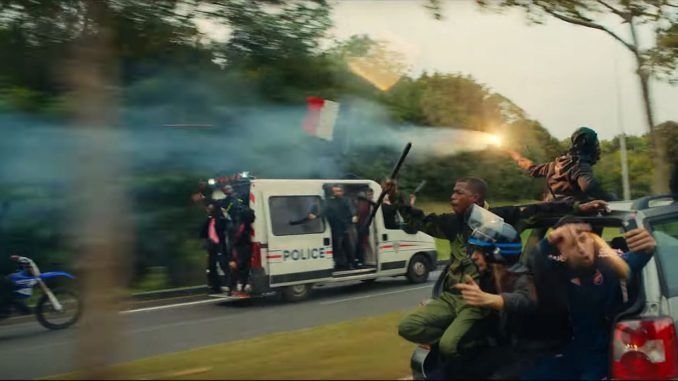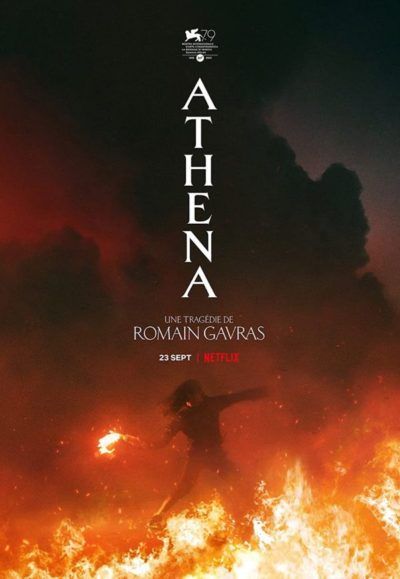
Rating: C+
Dir: Romain Gavras
Star: Dali Benssalah, Sami Slimane, Anthony Bajon, Ouassini Embarek
Initially released last September, this became increasingly topical in June. That month, France underwent a series of protests and riots, after the death of an immigrant teenager at the hands of French police, was captured on video and went viral, in a way almost eerily mirrored by the situation in this. The movie begins with Abdel (Benssalah), a soldier who is an older brother of the victim, making a plea for calm. It isn’t well received, with the police station being invaded by a mob of angry protestors, led by another sibling, Karim (Slimane). They steal weapons and retreat to the Athena estate, barricading themselves into the complex of buildings, and prepare for the arrival of the police.
It’s this tension between the two brothers which largely drives the film in the first half, with Abdel trying to stop things from spiralling out of control, while Karim wants vengeance for his dead brother. For example, when policeman Jérôme (Bajon) is separated from his unit and taken hostage, Karim seeks to exchange him for the officers responsible for his brother’s death. Abdel, on the other hand, feels this will inevitably cause an escalation, and seeks to hand the man back, with the help of shady drug dealer Moktar (Embarek), who has connections to corrupt cops in the department. This illustrates the well-handled subtleties here, rather than it being a case of ACAB. Indeed, there’s doubt whether the cops were responsible for the inciting incident, or if it was agitators seeking to start trouble.
 That said, it’s clear where Gavras’s sympathies lie. He entirely avoids the awkward question: if you want the police to stop treating you like violent barbarians, why are you acting like violent barbarians? Questions of moral philosophy aside, this is quite heavily front-loaded. It begins with a lengthy “one shot” sequence – quotes used, since it’s an Extraction-like stitch-up – of Karim’s raid on the police station and journey back to Athena, which is striking and has the camera apparently floating untethered. [Amusingly, the impetus for this was much like the opening of When Chinese Animals Attack films. Gavras said, “We needed to start really strong because even when I watch a Netflix film, if it’s not interesting in the first five minutes, I’m going to go away.”]
That said, it’s clear where Gavras’s sympathies lie. He entirely avoids the awkward question: if you want the police to stop treating you like violent barbarians, why are you acting like violent barbarians? Questions of moral philosophy aside, this is quite heavily front-loaded. It begins with a lengthy “one shot” sequence – quotes used, since it’s an Extraction-like stitch-up – of Karim’s raid on the police station and journey back to Athena, which is striking and has the camera apparently floating untethered. [Amusingly, the impetus for this was much like the opening of When Chinese Animals Attack films. Gavras said, “We needed to start really strong because even when I watch a Netflix film, if it’s not interesting in the first five minutes, I’m going to go away.”]
Much of the first half follows Karim and Abdel around the estate as they try to shepherd non-combatants to safety and brace for impact. It’s all very kinetic, yet at the same time, fluid and coherent. However, the film-makers, as much as the movie, seem to run out of energy the longer it goes on, and rather than a film of movement, it seems to close in on itself. Abdel ends up stuck with Moktar in a shuttered building, and proceedings grind to a halt. This seems the case particularly after the situation between Abdel and Karim is resolved, and it’s a bit unsatisfactory. While obviously driven by a vengeful rage, Karim never let that cloud his thought process – until it becomes necessary to the plot for it to do so. It feels like this represents the emotional peak of the story, and it’s a long downhill coast from their to the end credits. Still, we’ll always have those opening 11 minutes.
